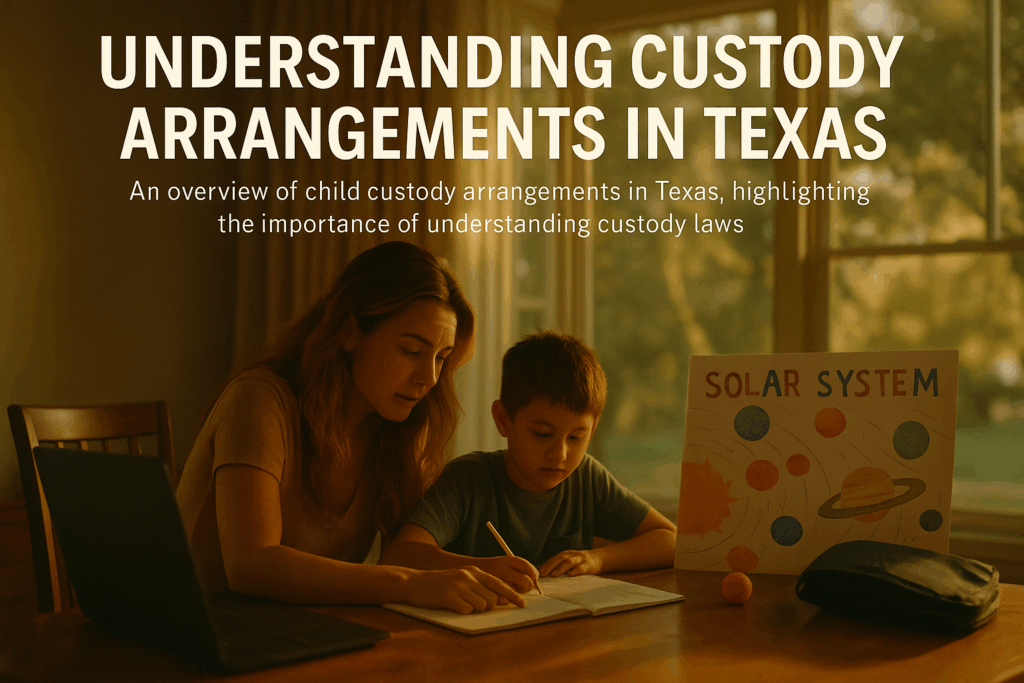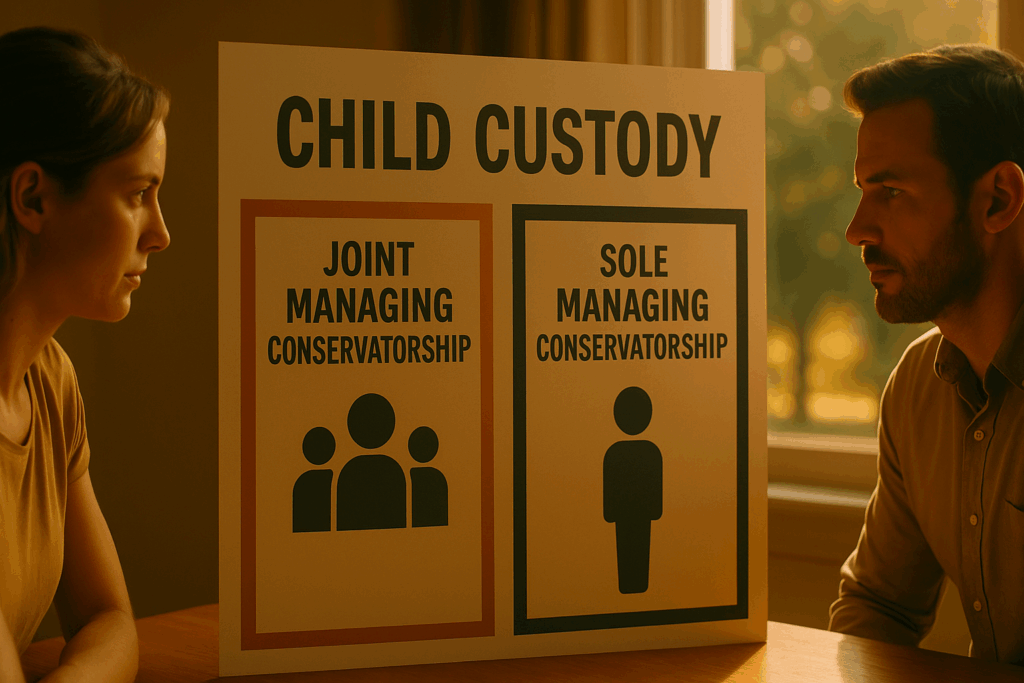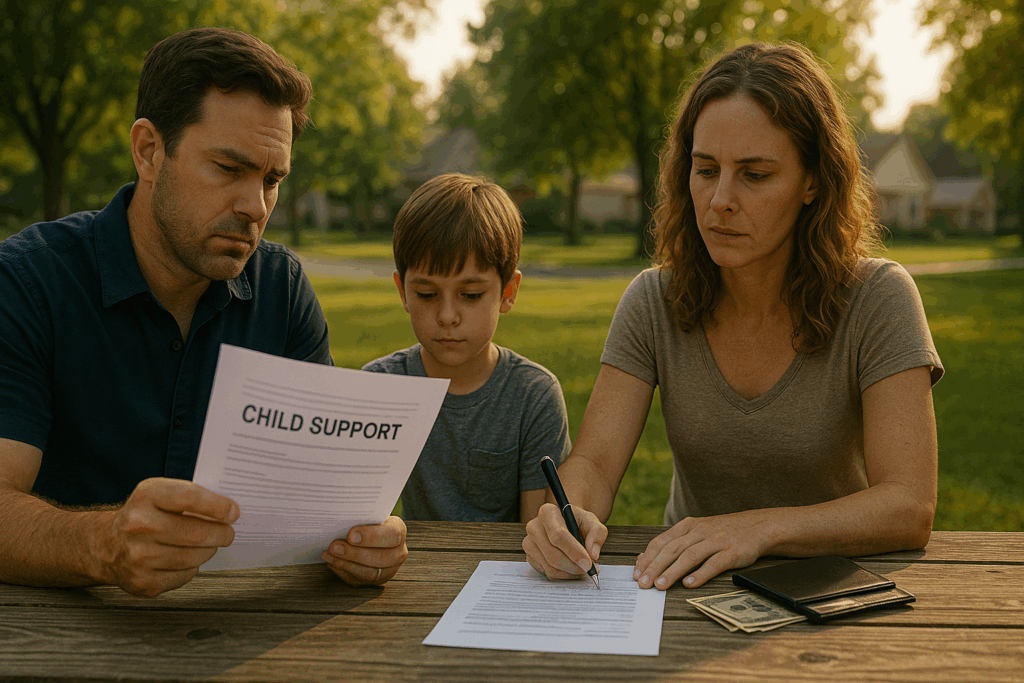
Ever try helping your kid finish a science fair project while coordinating backpacks, bedtime, and which parent’s Wi-Fi works better for homework? Parenting after divorce can feel like a group project without the group chat. Understanding Custody Arrangements in Texas is more than legal lingo—it’s the foundation that helps your child stay focused, stable, and successful in school.
The short answer? The way your custody agreement is structured can directly impact your child’s academic performance—from attendance and grades to emotional regulation and classroom behavior. In this post, you’ll learn how Texas courts prioritize school stability in custody decisions, what smart parenting plans should include, and how the right legal strategy can actually boost your child’s ability to learn and grow—even during major life changes.
We’ll share real-life stories, expert legal insight from our Houston-based team, and practical tips you can apply today—like how to talk to your child’s teacher about a custody change, when to seek tutoring or counseling, and how to protect school routines across two homes. If you’re navigating divorce or separation, this is the essential guide you didn’t know you needed—but your child will thank you for reading.
Key Takeaways
- Texas custody arrangements prioritize the child’s best interests, showcasing two primary conservatorship types: Joint Managing Conservatorship (JMC) and Sole Managing Conservatorship (SMC), each with distinct responsibilities and implications.
- Custody decisions are influenced by factors such as the child’s needs, family dynamics, and the parents’ ability to provide a safe environment, with courts also considering evidence of family violence or substance abuse.
- Parents have the flexibility to create customized parenting plans and schedules while emphasizing cooperation to maintain a nurturing environment and effective communication, crucial for the child’s emotional stability.
Overview of Child Custody in Texas
In Texas, the legal term for child custody is “conservatorship,” and gaining a solid grasp of it is essential for any parent navigating a divorce or custody dispute. According to Section 153.002 of the Texas Family Code, courts are required to base all custody decisions on one critical factor: the best interest of the child. This includes considerations such as each parent’s ability to provide a stable home, support academic and emotional development, and maintain a healthy relationship with the child.
Understanding custody arrangements in Texas means knowing the difference between Joint Managing Conservatorship and Sole Managing Conservatorship—terms that carry real weight in your day-to-day parenting rights. As we’ve seen in our work with Texas families, recent updates to the Texas Family Code underscore the importance of protecting children from instability, family violence, and interference with educational continuity. These updates reflect what our legal professionals have long advocated: custody isn’t just legal—it’s deeply personal.
If you’re unsure where to begin or what kind of arrangement fits your family best, we encourage you to explore our detailed breakdown here: Texas Child Custody Laws: Overview for Parents in Divorce. At The Law Office of Bryan Fagan, PLLC, our team is committed to educating families and protecting futures, one parenting plan at a time.
Legal Tip:
Navigating Texas child custody laws begins with knowing your rights as a parent and how those rights translate into day-to-day responsibilities. A clearly defined custody agreement can help reduce conflict, provide your child with a sense of stability, and meet the legal standards set by the Texas Family Code.
At The Law Office of Bryan Fagan, PLLC, our legal team works closely with Texas families to craft parenting plans that prioritize the child’s best interests while aligning with current state custody laws. To learn more about how custody works in Texas—including conservatorship, possession, and decision-making rights—explore our comprehensive overview: Texas Child Custody Laws: Overview for Parents in Divorce .

Types of Conservatorship: Joint vs. Sole
Texas law recognizes two primary types of conservatorship: Joint Managing Conservatorship (JMC) and Sole Managing Conservatorship (SMC). Under Texas Family Code § 153.131, JMC is generally presumed to be in the child’s best interest, as it enables both parents to share decision-making authority in major areas such as education, healthcare, and religious upbringing. However, it’s important to note that JMC doesn’t automatically guarantee a 50/50 possession schedule—it focuses more on legal rights than on physical time split. For families considering equal parenting time, our legal professionals have helped many clients understand the distinctions in this resource: 50/50 Custody in Texas – What Parents Should Know.
Understanding custody arrangements in Texas also means knowing when SMC may apply. Courts may assign one parent as the Sole Managing Conservator when there are significant concerns about the other parent’s ability to safely and reliably care for the child—such as in cases involving abuse, neglect, or substance misuse. In these situations, the other parent may be designated a Possessory Conservator with limited rights, including visitation, unless the court finds that contact would not be in the child’s best interest. The updated Family Code provisions emphasize protecting children from harm while ensuring stability in their day-to-day lives.
According to our family law team, knowing the legal and practical differences between these conservatorship types can make all the difference when planning for your child’s future. Whether you’re exploring shared parenting options or facing serious concerns about your co-parent’s behavior, it’s essential to build your case with both compassion and clarity. For more insight into creating the right parenting structure for your family, visit our child custody resource center, where we break down legal rights, visitation schedules, and what to expect in Texas family court.

Factors Influencing Custody Decisions
When it comes to understanding custody arrangements in Texas, parents should know that courts are required by Texas Family Code § 153.002 to prioritize one thing above all else: the best interest of the child. As our attorneys frequently advise, this means judges take a holistic view of each parent’s ability to meet the child’s emotional, physical, and developmental needs—not just today, but long term. Updated provisions in the Family Code further emphasize evaluating stability in the home, mental health, schooling, and protection from any risk of harm.
Judges often rely on the well-established Holley factors, which include the child’s age and preferences, each parent’s caregiving history, the strength of sibling relationships, and whether there is a history of abuse, neglect, or substance use. If concerns like domestic violence arise, courts may place strict limitations on parenting time to protect the child’s safety—sometimes restricting contact altogether. These evaluations ensure the court’s decisions reflect not just parental rights, but what environment will allow the child to thrive.
Our legal professionals have helped many clients understand how these factors come into play, especially in cases involving complex family dynamics such as parent splitting—a rare but sometimes court-approved custody structure. To learn how Texas courts approach splitting up siblings in custody or parenting across multiple households, visit our guide: What Is Parent Splitting?. For broader insights into how courts assess custody, explore our comprehensive child custody page, where we break down the legal standards and practical tools Texas families need during one of life’s most sensitive transitions.
Legal Tip:
A strong parenting plan begins with understanding the core principles behind Texas Family Law Custody Guidelines. These legal standards outline how parenting time, conservatorship, and decision-making responsibilities are determined with your child’s best interest in mind. The more informed you are, the more confident you’ll be in shaping a custody agreement that truly works.
At The Law Office of Bryan Fagan, PLLC, our experienced family law team is committed to helping parents create practical, court-ready custody plans that follow Texas Family Code requirements. For in-depth guidance on how to navigate conservatorship, visitation schedules, and more, explore our latest article: Key Insights into Texas Family Law Custody Guidelines .

Standard Possession Order (SPO) Explained
The Standard Possession Order (SPO) in Texas outlines a typical schedule for visitation between custodial and noncustodial parents. This court order aims to promote the child’s best interests by ensuring consistent and meaningful contact with both parents.
Under the SPO, noncustodial parents typically have the child for alternating weekends, ensuring quality time together. For parents living over 100 miles apart, the noncustodial parent can select one weekend per month for visitation, maintaining some level of connection despite the distance.
Specific schedules for holidays like Thanksgiving and Christmas help maintain family traditions and clarify which parent will spend time with the child during these special occasions.
Customizing Parenting Time Schedules
As we’ve seen in our work with Texas families, one of the most empowering aspects of understanding custody arrangements in Texas is recognizing that the Standard Possession Order (SPO) is not one-size-fits-all. While the SPO—outlined in Texas Family Code § 153.312—provides a foundational schedule, the law allows parents to tailor their parenting time through mutual agreement. Recent updates to the Texas Family Code continue to support this flexibility, encouraging parents to collaborate on customized arrangements that reflect their child’s unique needs, school routines, extracurriculars, and the realities of each household’s logistics.
According to our family law team, the courts strongly favor cooperative co-parenting and support schedules that promote consistency, emotional security, and minimal disruption. Whether it’s alternating weekends, adjusting exchange times, or modifying summer and holiday schedules, custom plans can reduce tension and enhance the child’s connection with both parents. As long as the arrangement serves the child’s best interest and both parties agree, courts are likely to approve a modified schedule that supports healthy family dynamics.
Our legal professionals have helped many clients understand how parenting time can intersect with broader divorce issues like property division and relocation. For a deeper dive into how parenting schedules may relate to homeownership or shared financial obligations, visit our article: Texas Child Custody and Property Issues From a Family Lawyer’s Perspective. You can also explore our Texas child custody resources to learn how tailored agreements not only meet legal standards but also support long-term family harmony.

Long-Distance Parenting Arrangements
Long-distance parenting arrangements require special considerations to ensure that the parent-child relationship remains strong despite the physical distance. Noncustodial parents usually have the right to extended summer visitation, which varies depending on the distance between parents.
For parents living over 100 miles apart, specific guidelines for weekend visits include:
- The noncustodial parent can select one weekend per month for visitation.
- Good communication is essential.
- Parents must provide written notice of any special arrangements regarding visitation schedules.
Addressing travel time and ensuring it doesn’t detract from quality time helps parents maintain meaningful connections with their child.
Calculating Child Support in Texas
In Texas, child support calculations consider the income of both parents and the number of children involved. The primary goal is to ensure that the child’s educational, medical, and emotional needs are adequately met.
Online calculators can provide estimates, but actual support amounts may differ due to various court considerations. Factors like the child’s specific needs and each parent’s financial capabilities significantly influence the final support order. Understanding these calculations helps parents prepare for their financial responsibilities.
Importance of Fair Support Orders
As our attorneys frequently advise, financial stability is a cornerstone of any well-structured parenting arrangement, and understanding custody arrangements in Texas includes knowing how support obligations are determined. Under Texas Family Code § 154.125, child support is calculated based on a percentage of the noncustodial parent’s net resources, currently capped at $9,200 per month. Net resources include wages, self-employment income, rental income, and even benefits, while deductions may include union dues, health insurance premiums, and court-ordered medical and dental support. These calculations aim to ensure children continue to receive the care they need without placing an undue burden on either parent.
Recent updates to the Texas Family Code have reinforced the need for accurate income reporting and added clarity to how courts may deviate from guideline support when warranted—such as in cases involving special medical needs, shared custody schedules, or high-income families. According to our family law team, well-crafted support orders not only prevent future disputes but also provide children with consistency in housing, education, and healthcare. Fairness in financial obligations can improve co-parenting communication and keep the focus on the child’s best interest.
Our legal professionals have helped many clients understand how child support intersects with broader financial planning during divorce. If you’re navigating support negotiations alongside questions about dividing marital property, debt, or financial responsibility, explore our in-depth guide: Know How Property and Debts Are Divided When Preparing for Divorce. For additional guidance on financial planning during divorce, visit our child support resource center to learn how we help Texas families protect their children and their financial futures.

Crafting Effective Parenting Plans
Crafting an effective parenting plan is essential for creating a stable and nurturing environment for the child. A strong parenting plan identifies the managing conservator and the possessory conservator, detailing the responsibilities and rights of each parent.
A key component of a parenting plan is a detailed timeshare schedule that specifies custody arrangements and how parents will handle holidays. The plan should also include clauses outlining decision-making responsibilities regarding health care, education, and disciplinary tactics. Effective written communication between parents to share parenting responsibilities and understand their rights and responsibilities reduces misunderstandings and helps focus on the children’s needs.
Key aspects of a parenting plan include:
- Flexibility to allow adjustments as the child grows from preschool to high school.
- Adherence to a mutually agreed visitation schedule to minimize disputes and emotional stress for children.
- Clauses to prevent parents from disparaging each other, fostering a healthier environment for the child.
Protecting Children from Conflict
As we’ve seen in our work with Texas families, understanding custody arrangements in Texas isn’t just about legal titles—it’s about creating a day-to-day environment where children feel safe, supported, and emotionally secure. The Texas Family Code, particularly Section 153.073, outlines the rights and duties of conservators, distinguishing between managing conservators who have decision-making authority and possessory conservators who maintain visitation rights without control over major life choices. While limiting decision-making can reduce conflict in high-tension situations, the goal is always to protect the child from becoming collateral in parental disputes.
The best parenting plans reflect this intent by promoting cooperative communication and reducing the child’s exposure to conflict. Possessory conservatorships can play a crucial role in maintaining the child’s connection to both parents, even when joint decision-making isn’t viable. Updated provisions in the Family Code continue to support custody agreements that are customized to minimize stress and avoid emotionally harmful environments. According to our family law team, these arrangements are not only legally sound—they’re emotionally strategic, laying the groundwork for long-term stability.
For parents navigating divorce and wondering how custody ties into other legal decisions like property division, our legal professionals have helped many clients understand the intersection between emotional and financial outcomes. To learn more about how divorce can proceed without splitting certain assets—and how custody still plays a central role—visit Can You Divorce Without Splitting Assets in Texas?. You can also explore our parenting plan resources to build a thoughtful, protective framework that keeps your child’s well-being front and center.
Legal Tip:
When it comes to Navigating Texas Custody Agreements, understanding your rights and responsibilities as a parent is essential. A well-structured agreement can provide your child with the consistency and security they need—both during and after divorce. From parenting time to legal decision-making, every detail matters.
Our family law team at The Law Office of Bryan Fagan helps parents create custody agreements that align with Texas Family Code standards and support long-term family stability. For actionable strategies and real-world guidance, explore our latest resource: Navigating Texas Custody Agreements for Family Stability .

Modifying Custody and Support
As our attorneys frequently advise, custody and support orders in Texas aren’t set in stone—life changes, and sometimes those changes call for legal updates. Understanding custody arrangements in Texas means knowing when and how you can seek a modification that better reflects your child’s evolving needs. Under Texas Family Code § 156.101, a court may modify a conservatorship or possession order if there’s been a material and substantial change in circumstances, or if the child is over 12 and expresses a preference to the court. Recent updates to the Family Code have clarified timelines and procedural requirements, making it even more important to follow the correct legal steps.
Parents generally must wait one year from the current order to request a modification, unless exceptional circumstances—such as danger to the child’s physical or emotional health—justify earlier intervention. Filing a petition involves presenting clear evidence that a change is not only necessary but also in the child’s best interest. According to our family law team, supporting your case with well-documented communication records, parenting schedules, and school or medical updates can significantly strengthen your position during a modification hearing.
Our legal professionals have helped many clients understand when a modification makes sense and how to prepare for what’s next. For a detailed guide on when and how to pursue changes to your parenting plan or support order, visit Understanding the Texas Child Custody Modification Process. You can also explore our child custody modification resources for compassionate, practical advice on building the next chapter of your family’s future with confidence and care.
Legal Tip:
If your custody arrangement no longer meets your child’s needs, understanding the Child Custody Modification Process Texas is essential. Life changes—whether it’s a move, new school schedule, or health concern—can justify updates to your parenting plan. Knowing your legal rights and how to present your case effectively can make a lasting difference.
At The Law Office of Bryan Fagan, PLLC, our family law team regularly helps parents petition for custody modifications that align with updated family circumstances and Texas Family Code requirements. For step-by-step guidance on filing, court standards, and what counts as a substantial change, explore our helpful breakdown: Understanding the Texas Child Custody Modification Process .
Legal Support for Custody Cases
Compassionate and knowledgeable legal support makes a significant difference when children are involved in a child custody case. An experienced family law attorney who understands both the legal system and parenting dynamics is critical in reaching a fair and functional outcome.
An experienced family law attorney can:
- Advocate for equal parenting time and meaningful involvement
- Represent clients’ interests in mediation or court, providing legal representation
- Assist clients in filing for custody or responding to petitions
- Negotiate parenting plans
- Calculate child support
The Law Office of Bryan Fagan emphasizes the importance of addressing custody concerns promptly and professionally, offering tailored legal advice during consultations.
Success Stories from Law Office of Bryan Fagan
The Law Office of Bryan Fagan has a proven track record of helping parents navigate custody, support, and visitation issues. Many clients have shared their success stories, resulting in favorable custody arrangements.
The dedicated legal team at the Law Office of Bryan Fagan provides expert guidance and representation, ensuring that parents achieve their desired outcomes. Parents seeking positive resolutions in their custody cases are encouraged to contact the Law Office of Bryan Fagan for qualified assistance.
Scheduling a Free Consultation
The Law Office of Bryan Fagan offers a free initial consultation for potential clients seeking assistance with custody and support matters. Interested individuals can easily schedule a consultation by calling the law office directly or using an online form.
Scheduling a free consultation allows parents to discuss their specific custody situations and receive tailored legal advice from experienced family law attorneys. This initial step can provide clarity and direction in navigating the complexities of child custody arrangements in Texas.
Legal Tip:
Facing divorce in Texas? A trusted Texas Divorce Attorney can help you navigate every step of the process—from filing and property division to child custody and support. The right legal guidance makes all the difference when you’re protecting your future and your family.
At The Law Office of Bryan Fagan, PLLC, we’re committed to providing compassionate, strategic support for individuals going through divorce. Whether your case is simple or complex, our team will advocate for your rights and help you make confident, informed decisions. Learn more about how we can help you by visiting: Texas Divorce Attorney Services .
Conclusion:
Custody isn’t just about calendars and courtrooms—it’s about helping your child feel secure enough to focus on spelling tests instead of stress. When parents take the time to understand their legal options and build thoughtful parenting plans, kids have a much better chance of staying on track, both emotionally and academically. And that’s something every parent wants, no matter how complicated the road may seem.
If you’re feeling overwhelmed or unsure of what the next step looks like, you’re not alone—and you don’t have to figure it out on your own. At The Law Office of Bryan Fagan, PLLC, we’re here to walk with you through each decision with clarity, compassion, and the legal strength to back it up. Because protecting your child’s future is what drives us every single day.
Whether you’re facing a custody dispute, crafting a parenting plan, or just trying to make sure your kid finishes fifth grade without switching schools three times, let’s talk. Schedule a free consultation today—and take the first step toward the peace of mind your family deserves.
And if nothing else, remember this: your child’s success story starts with your next smart move. Why not make it a confident one?
Frequently Asked Questions About Child Custody in Texas
What is the most common child custody arrangement in Texas?
The most common child custody arrangement in Texas is Joint Managing Conservatorship (JMC), where both parents share the rights and responsibilities of raising the child, even if one parent has primary physical possession.
What does a 70/30 split look like?
A 70/30 custody split typically means the child spends about 70% of their time with one parent (the custodial parent) and 30% with the other, often including alternating weekends and one or two weekday overnights.
What is the 100 mile rule in Texas?
The 100 mile rule in Texas affects possession schedules in custody cases. If parents live more than 100 miles apart, the noncustodial parent may receive one weekend per month instead of every other weekend, along with extended summer visitation.
What not to say during a custody battle?
During a custody battle, avoid badmouthing the other parent, making threats, exaggerating facts, or showing unwillingness to cooperate. Judges look for co-parents who prioritize the child’s best interest and can communicate civilly.
Who wins most child custody cases in Texas?
Texas courts do not favor one gender over another. However, the parent who demonstrates a stable home, active involvement in the child’s life, and a willingness to co-parent often receives primary conservatorship.
What is the healthiest child custody arrangement?
The healthiest child custody arrangement is one that provides consistency, minimizes conflict, and allows meaningful time with both parents—often a shared parenting schedule with cooperative communication and stability.
What is 60/40 child custody?
A 60/40 custody split means one parent has the child approximately 60% of the time and the other 40%. This arrangement can include every other weekend plus two weeknights or extended weekday stays.
What does a 5/2 split schedule look like?
A 5/2 split custody schedule means the child spends five consecutive days with one parent and the next two with the other, repeating weekly. It’s ideal for maintaining school routines while offering regular contact with both parents.
What custody schedule is best for a child?
The best custody schedule depends on the child’s age, needs, and the parents’ ability to co-parent. Generally, frequent, consistent contact with both parents in a low-conflict environment supports the child’s emotional and developmental well-being.





